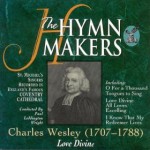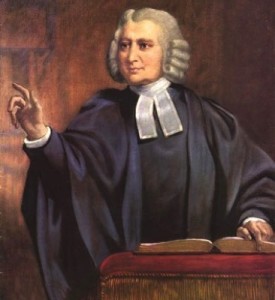 Love Divine, All Loves Excelling
Love Divine, All Loves Excelling
Love divine, all loves excelling,
Joy of Heav’n, to Earth come down.
Fix in us Thy humble dwelling;
All Thy faithful mercies crown.
Jesus, Thou art all compassion;
Pure, unbounded love Thou art.
Visit us with Thy salvation;
Enter every longing heart.
It’s estimated that Charles Wesley wrote somewhere between 3000 and 6000 hymns! No one has been able to count them! He wrote over 9000 literary texts in all. It seems he inherited his gift for poetry from his father, but it was his conversion to Christ that “unlocked it and set it free”, according to biographer Arnold Dallimore. Wesley didn’t need special events or long stretches of meditation to inspire him – he just always seemed to be composing hymns.
One of Charles Wesley’s friends, Henry Moore, described him as follows:
“When he was nearly eighty he rode a little horse, gray with age… Even in the height of summer he was dressed in winter clothes. As he jogged along… he jotted down any thought that struck him. He kept a card in his pocket for this purpose, on which he wrote his hymn in shorthand. Not infrequently he had come to our house in City Road, and, having left the pony in the garden in front, he would enter, crying out, ‘Pen and ink! Pen and ink!’”
 Charles and his wife, Sally, lived in Bristol, England, and later in London, so that Charles could work more closely with his brother, John. He worked in Methodist activities, but was constantly writing hymns. His last hymn was dictated to his beloved Sally while on his deathbed, in March 1788. It became a popular one-verse song among Methodists:
Charles and his wife, Sally, lived in Bristol, England, and later in London, so that Charles could work more closely with his brother, John. He worked in Methodist activities, but was constantly writing hymns. His last hymn was dictated to his beloved Sally while on his deathbed, in March 1788. It became a popular one-verse song among Methodists:
In age and feebleness extreme,
Who shall a helpless worm redeem?
Jesus, my only hope Thou art,
Strength of my failing flesh and heart.
Oh, could I catch a smile from Thee,
And drop into eternity!
Words: Charles Wesley | Music: John Zundel
S.A. Song Book #483 Section: The Life of Holiness – Challenge
Reference: Robert J. Morgan, Then Sings My Soul – Book 2
YouTube – Love Divine – Prince William and Kate Middleton Royal Wedding ENJOY
https://youtube.com/watch?v=VFckP0F93JM%26rel%3D0%26w%3D640





